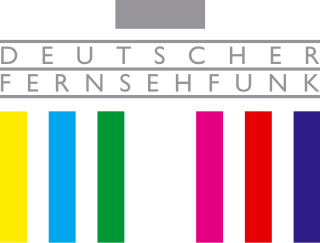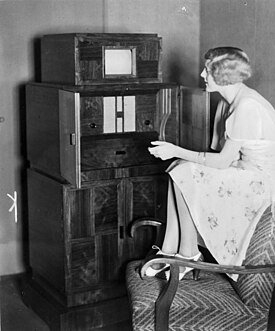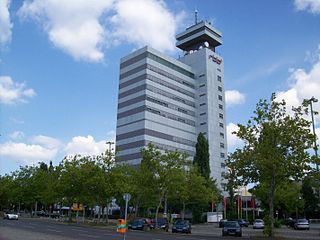
ARD is a joint organisation of Germany's regional public-service broadcasters. It was founded in 1950 in West Germany to represent the common interests of the new, decentralised, post-war broadcasting services – in particular the introduction of a joint television network.
Das Erste is the flagship national television channel of the ARD association of public broadcasting corporations in Germany. ARD and ZDF – "the Second" German Television Channel – together comprise the public service television broadcasters in the German television system. Das Erste is jointly operated by the nine regional public broadcasting corporations that are members of the ARD.
Television in Germany began in Berlin on 22 March 1935, broadcasting for 90 minutes three times a week. It was the first public television station in the world, named Fernsehsender Paul Nipkow. The German television market had approximately 36.5 million television households in 2000, making it the largest television market in Europe. Nowadays, 95% of German households have at least one television receiver. All the main German TV channels are free-to-air.

Norddeutscher Rundfunk is a public radio and television broadcaster, based in Hamburg. In addition to the city-state of Hamburg, NDR broadcasts for the German states of Lower Saxony, Mecklenburg-Vorpommern and Schleswig-Holstein. NDR is a member of the ARD consortium.

Radio Bremen (RB), Germany's smallest public radio and television broadcaster, is the legally mandated broadcaster for the city-state Free Hanseatic City of Bremen. With its headquarters sited in Bremen, Radio Bremen is a member of the consortium of German public broadcasting organizations, ARD.

Rundfunk Berlin-Brandenburg is an institution under public law for the German states of Berlin and Brandenburg, based in Berlin and Potsdam. RBB was established on 1 May 2003 through the merger of Sender Freies Berlin (SFB) and Ostdeutscher Rundfunk Brandenburg (ORB), based in Potsdam, and is a member of the Association of PSBs in the Federal Republic of Germany (ARD).

Astra Digital Radio (ADR) was a system used by SES for digital radio transmissions on the early Astra satellites, using the audio subcarrier frequencies of analogue television channels. It was introduced in 1995. As of February 2008, there were still 51 stations transmitting in this format. ADR ceased on 30 April 2012 when analogue broadcasts on Astra 19.2°E ended.

Sender Freies Berlin was the ARD public radio and television service for West Berlin from 1 June 1954 until 1990 and for Berlin as a whole from German reunification until 30 April 2003. On 1 May 2003 it merged with Ostdeutscher Rundfunk Brandenburg to form Rundfunk Berlin-Brandenburg.

Ostdeutscher Rundfunk Brandenburg, based in Potsdam, was the public broadcaster for the German federal state of Brandenburg from 12 October 1991 until 30 April 2003. It was a member organization of the consortium of public-law broadcasting organizations in Germany, ARD.

Rundfunk der DDR was the radio broadcasting organisation for the German Democratic Republic (GDR) from 1952 until German reunification, after which it continued until 1991 as Funkhaus Berlin, located at 18-50 Nalepastrasse.

Nordwestdeutscher Rundfunk was the organization responsible for public broadcasting in the German Länder of Hamburg, Lower Saxony, Schleswig-Holstein and North Rhine-Westphalia from 22 September 1945 to 31 December 1955. Until 1954, it was also responsible for broadcasting in West Berlin. NWDR was a founder member of the consortium of public-law broadcasting institutions of the Federal Republic of Germany, the ARD.

The Haus des Rundfunks, located in the Westend district of Berlin, the capital city of Germany, is the world's oldest self-contained broadcasting centre. Designed by Hans Poelzig in 1929 after he won an architectural competition, the building contains three large centrally located broadcasting spaces, which are shielded from street noise by the surrounding office wings. It is used today by local ARD broadcaster Rundfunk Berlin-Brandenburg (RBB) to make programmes carried by its Inforadio, Kulturradio, and Radio Berlin 88,8 channels. The building's large broadcasting spaces are occasionally also used to host concerts.

NDR Fernsehen is a German free-to-air regional television channel targeting northern Germany, specifically the states of Schleswig-Holstein, Lower Saxony, Mecklenburg-Vorpommern, Hamburg and Bremen. It is broadcast by both Norddeutscher Rundfunk (NDR) and Radio Bremen, although the former provides most of the output as they are bigger than the latter. It is one of seven regional "third programmes" offered by the ARD members.

Deutscher Fernsehfunk was the state television broadcaster in the German Democratic Republic from 1952 to 1991.

The first regular electronic television service in Germany began in Berlin on March 22, 1935, as Deutscher Fernseh Rundfunk. Broadcasting from the Fernsehsender Paul Nipkow, it used a 180-line system, and was on air for 90 minutes, three times a week. Very few receivers were ever privately owned, and viewers went instead to Fernsehstuben. During the 1936 Summer Olympics, broadcasts, up to eight hours a day, took place in Berlin and Hamburg. The Nazis intended to use television as a medium for their propaganda once the number of television sets was increased, but television was able initially to reach only a small number of viewers, in contrast to radio. Despite many technical improvements to camera technology, allowing for higher resolution imaging, by 1939, and the start of World War II, plans for an expansion of television programming were soon changed in favor of radio. The production of the TV receiver E1, that had just started was cancelled because of the war. Nevertheless, the Berlin station, along with one in occupied Paris, remained on the air for most of World War II. A special magazine called Fernsehen und Tonfilm was published.

RBB Fernsehen is a German free-to-air television channel owned and operated by Rundfunk Berlin-Brandenburg (RBB) and serving Berlin and Brandenburg. It is one of the seven regional "third programmes" that are offered within the federal ARD network.
Radio Bremen TV is a regional public service television channel owned and operated by Radio Bremen (RB) and serving Bremen, Germany. It is one of seven regional "third programs". The name reflects the fact these programs all came into existence after the Second German Channel was founded in 1961. They are organized within the federal network ARD.
Brandenburg aktuell is the television magazine of Rundfunk Berlin-Brandenburg (rbb) for the state of Brandenburg. The programme is broadcast daily on rbb Fernsehen at 7:30 p.m., while the viewers in Berlin receive the Abendschau. The magazine informs about political and cultural life in Brandenburg and provides background information on special events. Also the sport in Brandenburg as well as homeland stories from Brandenburg are topics of the show. In the early years, national and international reports were shown in Brandenburg aktuell, but these were abolished in 2000 when ORB Fernsehen began simulcasting the main 8:00pm edition of Tagesschau from Das Erste.
RBB Brandenburg was the third television channel for Brandenburg, (Germany) from January 1992 to March 2004. Until May 2003, it was organized by Ostdeutscher Rundfunk Brandenburg (ORB), then by its successor, Rundfunk Berlin-Brandenburg (RBB). On 1 March 2004, the two regional television channels of RBB – RBB Brandenburg and RBB Berlin – were integrated into the new rbb Fernsehen.















